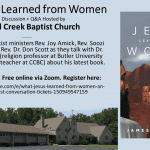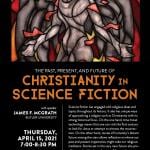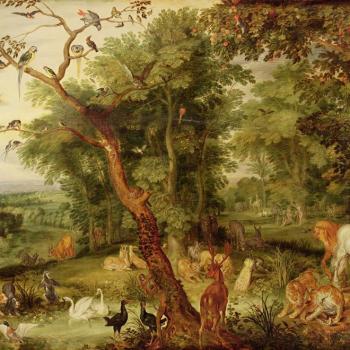Thanks to the Michigan Center for Early Christian Studies and all those involved in making my recent public lecture possible. I have decided to share the recording of the talk that I pre-recorded to ensure that clips from television shows that I wanted to include would come through correctly. I will also be sharing the text of the talk across multiple posts in order to allow those who attended to follow up on some of the authors and stories mentioned. The text of the introduction follows below the video. Subsequent parts will appear in blog posts I will share thereafter.
There is something distinctly odd about the intersection between Christianity and science fiction. But it isn’t the pairing of the two, the suggestion that there might be an interesting connection and interaction. Rather, it is the fact that after such a long history of engagement and despite the existence of such a natural connection, to some the pairing still seems odd. C. S. Lewis is more famous for his fantasy series the Chronicles of Narnia, but his space trilogy represents a classic example of how one might express their Christian theology in and through that genre. His first book in what became a trilogy, Out of the Silent Planet, was at least in part the result of a challenge to write sci-fi that Lewis and J. R. R. Tolkien set to one another. They flipped a coin, and had it gone the other way Lewis would have written about time travel rather than space, which would have made the result even more relevant to my talk today. Deciding what to write about by a coin toss with your friend, I might add, is no odder than Christianity and science fiction intersecting (indeed, far less so, but it isn’t a competition).
We are here today to discuss and analyze, not to promote or proselytize, and that is equally true with respect to sci-fi fandom and religion. Yet my own positionality, my perspectives and preferences, my allegiances and alignments, would inevitably come through, and I have made sure deliberately that they do, since none of us talks about a topic from nowhere or from everywhere. From a religious studies perspective, the critics are as interesting as the adherents. And even from the perspective of Christian faith, the scriptures contain condemnation upon condemnation of those who fail to be open to criticisms and calls to repentance. Either way, it is not just Christian authors like Madeleine L’Engle that are relevant. As germane to the topic are authors like Arthur C. Clarke who had a great antipathy to Christianity and explores that through his stories; Ray Bradbury, Baptist of upbringing but describing himself in 2010 as a “delicatessen religionist,” whose stories feature Christian characters and even figures who might be or are mistaken for Jesus; and Margaret Atwood whose depictions of Christian nationalism and theocracy have led to her being labeled anti-religious and more specifically anti-Christian, yet she rightly insists that she is nothing of the sort. Quakers and other religious noncomformists play heroic roles in The Handmaid’s Tale. Atwood also distances herself from the label “science fiction” for a variety of reasons.
So we see that Christians writing science fiction, Christians appearing in science fiction, Christians writing about science fiction, and scholars analyzing the presence and treatment of religious themes in sci-fi are all well-established and longstanding. Yet when the two are mentioned together, one still occasionally encounters puzzled looks. That reaction of puzzlement is itself perhaps worthy of further study.
This isn’t to say that there is nothing about today’s talk that might be considered odd. For one thing, it might be said to be odd for an academic like myself to be asked to speak about the subject. Why would someone who occupies the Clarence L. Goodwin Chair in New Testament Language and Literature at Butler University be chosen to address this topic? And why for that matter would the Michigan Center for Early Christian Studies sponsor such an event? There is certainly a story I can tell, about being a New Testament scholar who became a professor of religion at a university with a small religion program. In that program there was encouragement to develop courses outside my narrow area of expertise. The push to do so opened so many new avenues of teaching and ultimately of research. Developing a course on the intersection of religion and science fiction led to me writing nonfiction treatments of the topic, and eventually even to my writing some science fiction myself.
That may be an unusual journey in many ways, but I am not the only one to travel this sort of path. And because religious studies and film criticism, theology and literature, and other interactions related to this topic are inherently interdisciplinary pairings, it is natural for someone who approaches religion in interdisciplinary ways in teaching and research to engage with popular culture in at least one form, and often in more than one. In short, I write, teach, and speak to wider audiences about this topic because I study religion in texts and in living communities, write science fiction, and have several Starfleet uniforms and a very long scarf in my wardrobe (not to mention an even more extensive collection of geeky t-shirts).
There are more oddities to mention, a seemingly endless array, just as science fiction and religion offer delightful oddities and puzzling paradoxes that sometimes frustrate us and at others open our minds. For instance, it is also odd to me that so many who speak and write about connections between faith and film, theology and television, religion and recent releases on your streaming services, seem content to address superficial similarities and connections, such as “Christ figures,” characters who in some vague way are a tiny bit like Jesus. There is so much more depth to be explored, and I am grateful to those who have chosen to join me today on this journey into and across those fascinating depths.
If you come to today’s event as a skeptic because your training in the church or in Starfleet academy has led you to believe that I am exploring intersections between two forces that are like matter and antimatter, or if you prefer, the Dark and Light sides of the Force, I hope you will find by the end of my lecture that is not the case, that you have taken your first step into a much larger universe.
To everyone else who is already ready for this journey, already buckled in and ready for launch, I thank you for your patience with these preliminaries. Our theme of focus today is not any and every intersection of Christianity and science fiction, a historical survey of the interactions, but more narrowly on the way science fiction allows us unique perspectives on the past, the present, and the possible future of Christianity. Time travel to the past. Coping with aliens and androids in the present and near future. Exploring parallel universes and alternative histories. Imagining the distant future of the church. In all these ways, science fiction provides unique angles of approach to religion in general and Christianity in particular.
For those of you who love science fiction except for time travel stories, I hear you. Whether any of them is remotely coherent is a matter of debate, but plenty of them are self-contradictory or simply don’t make any sense at all. I would suggest, however, that what makes stories involving time travel, parallel universes, and for that matter warp drive and transporters interesting is not whether the technology could work in real life, or whether the story has errors of continuity and/or logic. There are narratives with contradictions in them and between themselves and others that are nonetheless interesting for the thought experiments they allow us to explore, the symbolism they allow the storytellers to convey, and for a variety of other reasons. I’ve sometimes wondered what it would look like to invoke time travel and changes to the timeline to reconcile the contradictory geographical movements and time frames in the infancy stories in the Gospels of Matthew and Luke, or the different accounts of Judas’ death and the Field of Blood in Matthew and Acts. Introducing time travel may solve some problems, but it will also inevitably introduce new ones. That doesn’t make the exploration of possibilities along these lines something inherently unworthwhile, any more than the tensions between the Gospels means we cannot appreciate the perspective each one offers on Jesus.
If only in our imagination, science fiction allows us to get in a TARDIS and travel to the first century to see Jesus for ourselves, bypassing the constraints of both the Gospels as literature and the methods of historical inquiry. It allows us to travel to a parallel universe and see how things might be different if some moment in the history of Christianity were different, or never existed at all. It allows us to cryogenically freeze ourselves or simply be born in the distant future and see what Christianity has become, or if it has persisted at all.
Science fiction also allows us to clone Jesus and do many other things relevant to Christianity, but while the possibilities for our imaginative storytelling may be endless, our time today is not. I will thus limit myself to the theme of the past, present, and future of Christianity as viewed through some of the unique lenses that science fiction provides.
Part One of the talk will follow soon…













